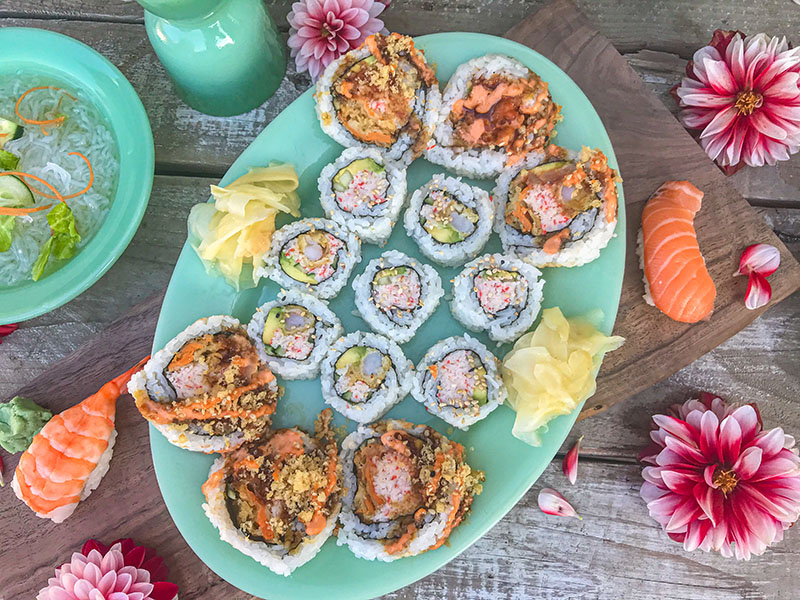Advertiser Disclosure: Some links on this site are affiliate links. If you click on them and make a purchase, I may earn a commission at no extra cost to you.
Your support helps keep FireKing Grill running. Thank you!
What is Fire-King Jadeite?
Fire-King is an Anchor-Hocking brand of glassware. It was originally produced in the 1940s for everyday use and was commonly given away as promotional items. Fire-King glassware came in a variety of colors and patterns, but Jadeite was the name given to the most popular milky green glassware.
Current Prices for Jadeite Dishes
What are Jadeite Dishes Worth?
Jadeite Dishes can sell anywhere from a few dollars to thousands of dollars each. It all depends how rare a particular pattern or dish is. Some dishes had a short production run, or had to be purchased separately from a boxed set, which makes them more valuable today.
If you’re wondering how much your Fire-King Jadeite is worth, your best bet is to research completed listings on eBay. That will give you the most up to date reference point. Make sure to see what listings have actually sold for – not just what’s for sale. From there, you can take a low-value completed listing and a high-value completed listing to determine an average value for your particular piece.
There are also several high quality reference books available to buy on Amazon that can help you determine the price of bowls, mugs, plates, and rare pieces. We recommend the book “Jadite: Identification & Price Guide”.
Keep in mind that Jadeite glassware is an investment, as time goes by, it becomes even more rare and the price will continue to climb.If you can get your hands on a coveted piece of Jadeite glassware or if you’re lucky have it passed down to you, hold on to it! You have a piece of history that’s only going up in value.
Who Makes Jadeite Kitchenware?
The three major companies that produced Jadeite kitchenware from 1930s to 1975 were:
- Fire-King, Anchor Hocking
- Mckee
- Jeanette Glassware
You can still find reproduction Jadeite glassware still produced by Anchor Hocking (marked Fire-King 2000), Tablecraft and Pioneer Woman.
Learn More: The History of Jadeite Dishes
Learn More: The History of Anchor Hocking’s Fire-King (Part 1: Intro)
What Markings Were Used on Jadeite Dishes?
Anchor Hocking’s Fire-King: Anchor Hocking’s line of Fire-King Jadeite dishes had the longest production run and were made from 1945 to 1975. Unlike McKee and Jeannette, Fire-King Jadeite dishes do not glow under a black light. A number of markings which changed throughout the years. Learn how to identify Fire-King markings with our detailed guide with pictures.
McKee: McKee Jadeite dishes were mostly produced in the 1930s and 1940s. Look for the “McK” stamp inside a small circle on the bottom of Jadeite dishes to identify them. Keep in mind, some original McKee jadeite dishes are unmarked.
Jeannette Glass Company: The Jeannette Glass Company made Jadeite dishes from the 1930s to the early 1950s. Early Jeannette Jadeite dishes have a “J” inside of a triangle, however most dishes are unmarked.
Both McKee and Jeannette Jadeite dishes glow under a black light, so bring one with you on your next trip to the antique store so you can verify.
Learn More: Do Jadeite Dishes Glow in the Dark?
What is Jadeite Glassware Made Of?
Before World War II, tiny bits of uranium salts were used to add color to glassware. Uranium salts were a byproduct of the radium extraction industry at the time. You know you have an old piece of jadeite if it glows in the dark under a black light.
Jadeite was then made with green scrap glass that was added to a milk glass mixture. Quality control was poor, and the kitchenware was cheap to make which is one of the reasons you‘ll find different shades of jadeite glassware.
What is Jadeite Restaurantware?
Our personal favorite, Jadeite Restaurantware was mass produced to be used in diners, school cafeterias and military bases. It’s durability was unmatched to other popular dishware at the time. Restaurantware mugs, plates and bowls were made with heavier glass than other Jadeite patterns intended for home use.
Where Can You Buy Fire-King Jadeite Dishes?
You’re quickest and easiest way to buy Jadeite glass is from eBay or Etsy. However, if you enjoy the hunt you’ll want to check out your local antique shops. Consider it a diamond in the rough to score a piece of FireKing jadeite at a thrift store or even a garage sale. Yes, it’s entirely possibly, but Jadeite is so popular that there are plenty of other collectors looking for the same thing. You’re time is better spent at the antique malls and stores.
Learn more about where to buy Jadeite dishes.
Why are Jadeite Dishes So Popular?
During the Depression, the green glass color was meant to add a bit of joy to people’s lives during an otherwise, well…depressing time.
And although the dishes are highly collectible today, back when they were originally produced, they were seen as cheap quality, and the workhorses of the kitchen. These dishes were durable and made to handle high temperatures, and built to last.
Some collectors still enjoy the bright and cheery color of the dishes and the fact they were built to last. Others enjoy the rich history dating as far back as the late 1800s. And then there’s the nostalgia that reminds people of their parents or grandparents using Jadite in the kitchen.
Jadeite Glassware was most notably popularized by Martha Stewart in the early 2000s with her impressive collection displayed on her TV show.
Fire-King Jadeite is extremely popular in Asian culture, and if you ever find yourself in Japan, you’ll have to check out the Fire-King Cafe, a restaurant that is decorated with Jadeite as well as serves food on Jadeite.
Read More: How to Care for Jadeite Dishes
Current Prices for Jadeite Dishes
Advertiser Disclosure: Some links on this site are affiliate links. If you click on them and make a purchase, I may earn a commission at no extra cost to you.
Your support helps keep FireKing Grill running. Thank you!



Leave a Reply